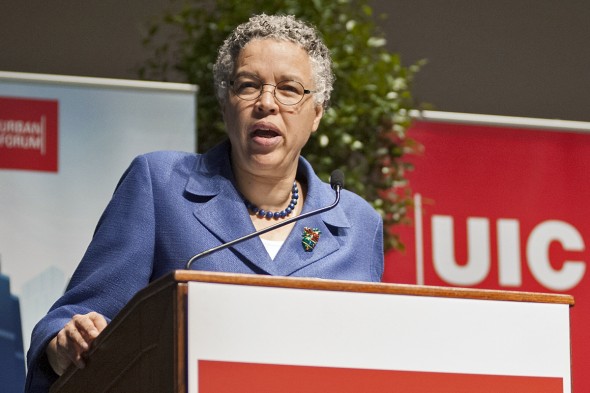Commissioners vote with Preckwinkle more than predecessor

The Cook County Board votes with Toni Preckwinkle 73 percent of the time, a new study reports. Photo: Roberta Dupuis-Devlin/UIC Photo Services
Cook County Board President Toni Preckwinkle’s high levels of support from county commissioners approaches the City Council support achieved by Chicago mayors Richard M. Daley and Rahm Emanuel, says a new report from the UIC political science department.
The study, “The Cook County Board in the Preckwinkle Era,” compares the board voting record since Preckwinkle was elected with votes during the final year of former board president Todd Stroger’s administration.
“In the three-and-a-half years since her election, Preckwinkle persuaded the board to roll back the second half of former board president Todd Stroger’s 1 percent sales tax increase, and each year won approval for her proposed budgets with no more than one dissenting vote,” said political science professor Dick Simpson, one of the report’s authors.
The study finds Preckwinkle has received more support for her policies and programs than Stroger. The board voted with him 68 percent of the time, compared with Preckwinkle’s 73 percent.
Preckwinkle does not have a vote on the board, but her floor leader, Commissioner Jesus Garcia, represents her position and votes accordingly.
Much of her board support comes from fellow Democrats — Edwin Reyes at 90 percent, Robert Steele at 86 percent, John Fritchey and Bridget Gainer at 83 percent and John Daley at 81 percent — but her backers don’t always follow traditional party lines.
Four Republicans on the board supported Preckwinkle more than 60 percent of the time — Peter Silvestri at 73 percent, Greg Goslin at 71 percent, Timothy Schneider at 70 percent and Elizabeth Doody Gorman at 63 percent.
The least supportive Democratic commissioners were led by William Beavers and his replacement Eugene Moore, who combined to only vote 41 percent of the time with Preckwinkle. They were followed by Earlean Collins at 42 percent and Joan Patricia Murphy at 54 percent.
Authors of the report credit Preckwinkle’s leadership style — more assertive than Stroger and less antagonistic than Emanuel — for stabilizing the previously fractured Board of Commissioners.
The most divided issue during the Stroger era was the 1 percent sales tax increase, which Preckwinkle successfully eliminated.
During the Preckwinkle era, the most controversial ordinances have included ethics reforms referred back to committee, the release of undocumented immigrants from county jail before federal verification of immigration status, and the regulation of waste transfer stations to reduce waste and encourage recycling.
Simpson said Preckwinkle is in a comfortable position politically.
“She avoided any opposition in last March’s Democratic primary and neither the Republicans nor a third party have yet selected candidates to challenge her in November’s general election,” he said.
The report’s other authors are graduate researcher Melissa Mouritsen Zmuda, undergraduate researcher Kelly McKevitt and political consultant Thomas Gradel.
